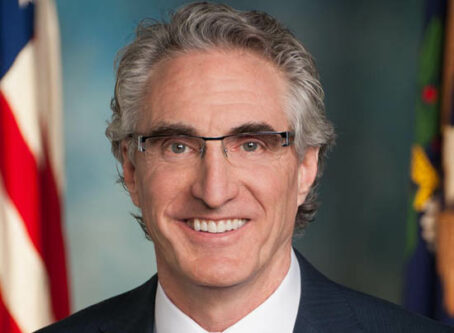Connecticut governor not done yet with truckers
Two days after the Connecticut General Assembly approved a truck tax pursued by Gov. Ned Lamont, the governor said Thursday he also is hopeful of pushing through a separate plan to aid transportation work and limit vehicle emissions.
Lamont has been busy this year looking to raise transportation revenue on the backs of professional drivers. After his failed effort a year ago to charge truck-only tolls, the governor picked up pursuit of a regional climate plan to aid transportation.
Transportation Climate Initiative
Late last year, Lamont and the governors in Massachusetts and Rhode Island and the mayor of Washington, D.C., signed a memorandum of understanding stating their intention to bolster transportation funding and reduce emissions.
Each participating state is responsible for approving the final tax plan. The expectation is fuel costs could initially increase anywhere from 5 to 17 cents per gallon.
Dubbed the Transportation and Climate Initiative, the regional climate pact requires large gasoline and diesel suppliers to buy what are called “allowances” in a cap-and-trade plan. Essentially, companies would be limited to how much carbon dioxide they could emit. After reaching its cap, a company could pay the government a certain amount of money to go beyond that limit. The number of allowances a company could purchase would decline each year.
Legislative pursuit
Earlier this spring, legislation introduced at the Connecticut statehouse called for formally joining the regional climate pact.
Critics, including statehouse Republicans, voiced concern about the program essentially being a fuel tax increase that would burden road users and business owners.
Supporters said late last week that criticism of the program amounts to fearmongering. They painted the program as the future of transportation funding.
Lamont decided on June 4 to abandon pursuit of the plan.
Senate Democrats said the issue could be brought back for consideration during the 2022 regular session.
Highway use tax
Attention at the statehouse for how to boost transportation funding then quickly turned to truck drivers.
The legislature voted Tuesday in the final hours of the regular session to approve an emergency bill filed two days earlier to impose a highway user fee, or tax, on Class 8 through 13 trucks. The bill, HB6688, passed largely along partisan lines.
Senate Transportation Committee Chairman Will Haskell said it is time to stop giving trucking operations a “free ride” in Connecticut.
“Some may ask why impose a fee on trucks,” Haskell, D-Westport, said on the Senate floor. “Because, at this moment Connecticut taxpayers are subsidizing the tremendous wear and tear that large tractor-trailers have on our highways.”
Lamont’s bill establishes a series of fees based on truck size and weight.
Starting Jan. 1, 2023, tax rates would increase incrementally for trucks starting at 26,000 pounds. Specifically, rates would range from 2.5 cents per mile for trucks with a gross weight of 26,000 pounds to 10 cents per mile for trucks weighing 80,000 pounds.
Trucks weighing more than 80,000 pounds would pay 17.5 cents per mile.
An exception would be made for milk haulers traveling to or from a dairy farm.
The state’s Office of Fiscal Analysis estimates revenue from the tax at $90 million annually.
Singling out truckers
OOIDA Director of State Legislative Affairs Mike Matousek said it is not a surprise that Connecticut legislative leaders are singling out truck drivers.
“This is yet another effort by Gov. Lamont and his anti-trucking allies to raid the bank accounts of some of the hardest working people on the planet,” Matousek said. “Big trucks – especially out-of-state trucks – make for an easy target and elected officials have picked up on that.”
As an industry, we need to figure out a way to change that dynamic and hold lawmakers more accountable for their bad decisions.”
Truckers in the state say that out-of-state operations will avoid travel in Connecticut. In-state businesses will be left to pay the tax.
Critics add that truck fees will result in additional costs for all consumers. As a result, the state’s economy will suffer.
Senate Republican Leader Kevin Kelly of Stratford said earlier in the week the truck tax is a bad look for the state.
“The very people we praised as frontline essential workers during the pandemic, who went above and beyond to transport necessities to us when we could not go very far ourselves, would be the target of this tax,” Kelly said during Senate floor discussion. “And the tax will be passed on to our families.”
Lamont goes on the offensive
Gov. Lamont made clear Wednesday on social media how his administration views trucking professionals who are opposed to the additional tax.
“The trucking lobby is threatening to have drivers go around Connecticut because of the highway user fee. That’s fine,” Lamont said. “We’ll have less air pollution, safer and better quality roads, and less people with asthma. Looks like the highway user fee is already working.”
The trucking lobby is threatening to have drivers go around Connecticut because of the Highway User Fee. That’s fine. We’ll have less air pollution, safer and better quality roads, and less people with asthma. Looks like the Highway User Fee is already working. pic.twitter.com/yrVYROf0Qq
— Governor Ned Lamont (@GovNedLamont) June 10, 2021
Special session
Lamont announced on Thursday he wants to continue pursuit of the regional climate pact sooner rather than later.
A special session to address a limited agenda could start as early as next week. The governor said he will call on legislators to include consideration of the regional climate pact.
“I’ve talked to everybody. I said I think it’s the right thing to do. I think it’s the right thing to do for this state. I think it’s the right thing to do for our kids. I think it’s a small fee on petroleum wholesalers. I think it makes sense,” Lamont said during a press conference. “That being said, if the legislature doesn’t want to take it up, that’s their call but I’m pushing.” LL
More Land Line coverage of news from Connecticut.
Read about some recent comments disparaging truckers by Gov. Ned Lamont here.









